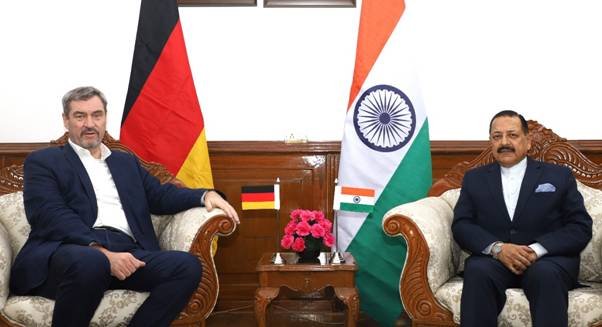
In a major step forward for Indo-German relations, Dr. Markus Söder, Minister-President of the German State of Bavaria, held a meeting with Dr. Jitendra Singh, India’s Union Minister of State (Independent Charge) for Science & Technology and Earth Sciences. The discussions highlighted the expanding partnership between the two nations in the most advanced science, technology, and innovation.
Following a one-on-one meeting, both leaders led a high-level delegation discussion to explore opportunities for enhanced cooperation in crucial sectors. These include Artificial Intelligence, Quantum Technologies, Clean Energy, Biotechnology, Cyber-Physical Systems, Green Hydrogen, and Electric Mobility.
Dr Jitendra Singh welcomed the German delegation, emphasising the robust and time-tested Indo-German collaboration in science and innovation. “India has embarked on mission-mode programs under the visionary leadership of Prime Minister Narendra Modi. We seek economic and sustainable solutions through scientific and technological interventions, and Germany is a natural partner in this endeavour,” he said.
A key highlight of the meeting was the Indo-German 2+2 model of collaboration—bringing together academic institutions and industries from both nations to drive joint research, innovation, and commercialization. Dr Singh hailed the initiative as a “futuristic model” designed to address global challenges through co-development and innovation-driven ecosystems.
Reflecting on the Golden Jubilee of the Indo-German Science and Technology (S&T) Partnership celebrated last year, Dr Singh recalled the rich intellectual exchange between the two nations. He cited Max Mueller’s seminal translation of Indian scriptures, such as the Rigveda and Upanishads, as the foundation of Indo-European scholarly engagement.
India’s growing prominence in biotechnology was also a focal point of the discussion. Dr Singh noted that India currently hosts over 3,000 biotech startups and is home to the world’s largest vaccine production infrastructure. He pointed to the recently approved BIOe3 policy—focused on Energy, Economy, and Employment—as a catalyst for the next wave of biotech-led growth.
He also stressed on India’s strides in the Space-Tech and Nuclear sectors, both of which are now open to private players and international collaboration. “India ranks third globally in startups and unicorns, making it a vibrant destination for global tech partnerships,” he added.
In the field of education, Dr. Singh celebrated the increasing academic exchange between the two nations, noting that over 50,000 Indian students—primarily in STEM fields—are currently studying in Germany, a number that has tripled over the past seven years. He expressed hope for a reciprocal rise in the number of German students exploring India, particularly in Oriental Studies, Indian Culture, and Traditional Knowledge Systems.
“Germany has emerged as a favoured academic destination for Indian youth. Now we hope to see more German students exploring India’s intellectual heritage and scientific capabilities,” Dr. Singh said, also fondly recalling his recent visit to Berlin where Indian culture and cuisine are increasingly being embraced.
The meeting concluded with a renewed commitment from both sides to elevate Indo-German collaboration across strategic sectors and to build a resilient, innovation-led future.
Source: PIB